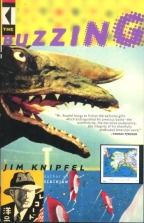The Buzzing
Jim Knipfel
Vintage Contemporaries / Random House
US Trade Paperback Original
ISBN 1-400-03183-4
Publication Date: 03-11-2003
259 Pages; $12.00
Date Reviewed: 06-15-03
Reviewed by: Rick Kleffel © 2003

REFERENCES
COLUMNS
|
|
|
The BuzzingJim KnipfelVintage Contemporaries / Random HouseUS Trade Paperback OriginalISBN 1-400-03183-4Publication Date: 03-11-2003259 Pages; $12.00Date Reviewed: 06-15-03Reviewed by: Rick Kleffel © 2003 |
|
|
REFERENCES |
COLUMNS |
The world as we know it is probably strange enough. The events behind the headline news are so tweaked that the old "kook beat" reports that run in newspapers like the Weekly World News are beginning to seem tame. Horror novels based on the exploits of these reporters are going to have to evolve to keep ahead. Perhaps the first step in this evolution is represented by Jim Knipfel's intriguing and occasionally frustrating novel 'The Buzzing'. It might at first seem like the same old story - a past-his-prime reporter begins to think that he's stumbled on to an actual conspiracy. But Knipfel, who is the author two works of non-fiction based on a life that sounds a lot wackier than anything that makes it between these covers is not just offering yet another 'Night Stalker' retread. Unfamiliarity, or (more likely) an inability to care keep Knipfel from simply recycling old material. Knipfel has something more important to say. Knipfel wants nothing less than pure madness. He gets a good head start with Chip Kidd's fine and wacky cover design that proves to be surprisingly relevant.
Roscoe Barragon is a reporter straight out of central casting. Once great, now overweight and past his prime, his life is focused on the few hours when he can swill beers at an otherwise empty bar with his only friend, a woman who works for the local morgue. Of course, he can barely get away from his desk without getting a phone call that readers at first will suspect is also out of central casting. But as this and other kook beat reports come in, the book starts to diverge from the standard-issue reporter of horror theme. Yes, Barragon gets lots of calls that are genuinely weird. But they from sane people who have come to believe that they're crazy, or been called crazy, because they have experienced some supernatural phenomena that turns out to be real in the context of this novel. Barragon's callers offer up monologues that sound a lot like what comes out of the mouths of actually, factually insane paranoid schizophrenics. There's no obvious overarching conspiracy behind them all, and no obvious single supernatural phenomena behind them all. There's no obvious solution that quickly presents itself to even the most savvy genre reader. The hints provided are maddeningly obtuse and difficult to connect. Barragon drinks a lot, and falls asleep in front of the Japanese horror movies that he so loves. The phone calls and stories roll in, making sense only to the callers. Or do they?
The occult secret that is discovered by an outsider forms the core of the horror reading experience. It's usually pretty obvious pretty fast what's going on. 'The Buzzing' excels when Barragon is picking up his calls or encountering the people who made them in person. Knipfel has obviously listened to actual paranoid schizophrenics. Unlike their counterparts in genre fiction, actual madmen are actually mad, and their rants are not surreal poetry but disconnected, vague and disjointed. In 'The Buzzing', Knipfel offers palpable mental illness, not genre shtick. As a result, the secret suggested by all the informants is excellently, tantalizingly just beyond the reader's reach. As Barragon's drinking increases, an unfortunately uncommon question begins to occur to the reader: Is Barragon going crazy?
Knipfel is adept at injecting humor into his ever-sharpening observations. With the exception of Barragon and his cast of crazies, the characters tend towards the flat side, though there's a nice little yuppie for readers to spit on. The potentially interesting Emily, his woman friend who works at the morgue, never quite gets out into three dimensions, though Knipfel is to be greatly congratulated for not shoving a standard-issue romance into the narrative. Ed Montgomery, his editor, is pretty much out of central casting. Overweight, red face - you know the drill.
The paranoid weirdoes who call up or confront Barragon are another matter entirely. Knipfel has actually listened to their language. Their rants take the kind of hairpin turns not usually seen in fiction about the mentally ill. Their lives are not Hallmark movie fodder. These are the deluded, the cast-on-the-street by compassion. But, while their rants have the ring of truth (at least they sound truly insane), they don't add up to entertainment. Knipfel and Barragon try bravely to bring them together into an uber-conspiracy, but the plot never quite gels. Knipfel puts together something fairly insane, make no mistake. In the end, the book may strike the reader as both intriguingly and irritatingly plotted. Knipfel wants to have a lot of fun with conspiracy theory, and he does. But he also wants to say something serious about alcoholism and the delusions of the mass media, which he also does. The whole is not in this case greater than the sum of the parts.
'The Buzzing' is certainly a quick and easy-to-read book. It's pretty funny and it's not pretentious. But the book finds itself becoming that which it portrays. It succumbs to the madness it observes so closely. It wants you to believe that it's a lot more than what it seems to be, but it's not going to tell you what that is. Its observation that life is conclusively inconclusive is not that hard to come by. You can probably walk down the street of any big city and find someone with a decent sounding conspiracy theory. You can drink yourself into a stupor and begin to see the connections. But real life includes a hangover that's never as entertaining as what precedes it.